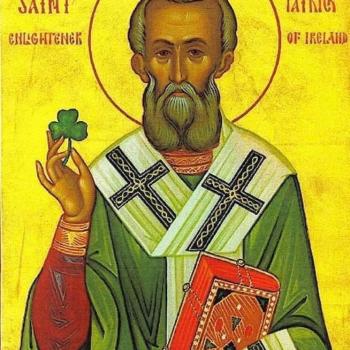Lectionary Reflections
Numbers 21:4-9
Fourth Sunday in Lent
March 18, 2012
This very peculiar, spooky text would certainly have remained in deserved obscurity if John's gospel had not dragooned it for an allegorical reference to Jesus' crucifixion: "Just as Moses lifted up the serpent in the wilderness, so the Son of Man must be lifted up" (Jn. 3:14). Such a strained exegesis would not be tolerated today among us sophisticated readers, but the reference has cemented the older story into the traditions of Lent. As we move closer to Good Friday and the cross, Moses' action in the wilderness becomes a part of the story we inhabit. In short, we are stuck with the thing in perpetuity.
So, what are we to do with this obvious bit of ancient apotropaic magic? This mention of "fiery serpents" and snake-pole healing is far too reminiscent of snake-handling Appalachian Pentecostal worshippers for my taste. What exactly can we make of this story in the 21st-century beyond either accepting it in some crude "historical" way or discounting it completely as a hoary tale from the magical past? Let's give it another look to see what it may have been remembered for in the first place.
"They marched from Hill's Hill by the Reed Sea Road to go around the land of Edom; and the people were impatient on the way" (Num. 21:4). In the story of the wilderness wandering according to the book of Numbers, Israel travels through the Sinai, encountering various peoples along the way. In the vignette that precedes our text, the Canaanite king, Arad, fights with the travelers and captures some of them. That causes Israel to pray to YHWH for victory over Arad, a victory that YHWH grants after Israel promises to "utterly destroy their towns" (Num 21:3). "Utterly destroy" is the notorious Hebrew word cherem, which could be translated "put to the ban" or "sacrificed to YHWH." This quite monstrous claim appears to be based on the idea that if any of Israel's enemies are left alive, they could serve as snares to the weak-willed people, leading them to desert their God. Hence, obliterating them is the safest way. We should be glad that the likelihood of this ever happening in reality is very small, given the nature of the wanderers, encumbered by women and children and lack of war-making capabilities, and the settled communities of greater power that they encountered. Nonetheless, those historical facts do not at all draw the sting of the concept of annihilation of one's foes.
The more arresting issue raised by our text is the "impatience" of the people. This word is literally "short" in Hebrew and is tied to the Hebrew nephesh, "life, breath" or even "throat" in English. "Short-lived" means here "impatient" or perhaps "short-tempered." The result of this Israelite "shortness" is: "The people spoke against God and against Moses, 'Why have you brought us out from Egypt to die in the wilderness; there is no food and no water, and we are impatient (same structure as above) with this cursed food'" (Num. 21:5).
The story takes a hilarious turn. The short-tempered people now complain quite directly to God and to God's agent, Moses, about the lack of food and water in the blasted wilderness. Indeed, in earlier parts of Numbers they have rather "grumbled/complained" (a different Hebrew verb) about these same lacks, along with general fears of enemies and death in the wasteland of the desert. But here, note that they are impatient with the lack of food, but quickly add that the food they do have (really?) is "cursed" or perhaps "despicable." It is not the absence of food that makes them impatient, but rather the kind of food that God has provided does not match their palates. Manna will no longer suffice; filet mignon, medium-rare, is what they have in mind! It is very hard to work up much sympathy for these wretches; YHWH's gift of freedom from Egypt is met with their constant grumbling and impatience, and their refusal to accept all that YHWH and Moses have provided for them.
It is finally that roiling rejection of YHWH's goodness that drives YHWH to punish them with "fiery snakes" that bite the people, "so that many Israelites die" (Num. 21:6). In the book of Exodus, after these same Israelites force Aaron to mold them a molten calf at the base of the sacred mountain, offering them, they think "a god who brought us up from the land of Egypt," YHWH announces to Moses that the jig is up and that the calf-builders are about to receive from YHWH what they so richly deserve. There in Exodus 32 Moses convinces YHWH not to carry out this dark plan. But not here. Moses does not intervene here. YHWH is fed up, and the snakes appear to exact a terrible vengeance.
With the fiery snakes nipping and snapping all around them, and many of their fellow Israelites lying dead, the people rush to Moses and cry, "We have sinned because we have spoken against YHWH and you; pray to YHWH to remove the snakes from us!" (Num. 21:7) Moses does so, and YHWH responds, "Make a Seraph, and put it on a pole so that any who are bitten can look at it and live. So Moses made a copper viper (there is a rhyming pun in Hebrew—nachash nechosheth) and put it on a pole. Whenever the snake bit someone, that person would look at the copper viper and live" (Num. 21:8-9).





